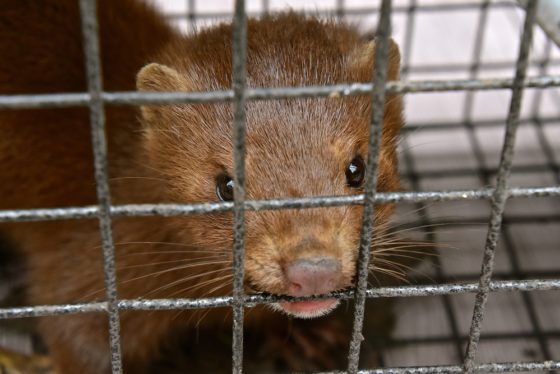Dutch mink farms in spotlight again after mutant Covid virus found in Denmark


The World Health Organisation is looking into biosecurity at mink farms following the decision by Denmark to cull all 17 million mink on the country’s fur farms because a mutated version of coronavirus has spread to people who work on them.
The WHO’s coronavirus technical chief Maria van Kerkhove told a briefing in Geneva on Friday that transmission of the virus between animals and humans was ‘a concern,’ but added that mutations are normal and have been tracked since the beginning of the pandemic, Reuters reported on Friday.
The Netherlands is the third biggest mink farming nation in the world.
Health minister Hugo de Jonge told MPs on Wednesday the cabinet does not have any indications that the virus has mutated in the same way here, but the farm ministry has not yet replied to DutchNews.nl questions about the implications for the Netherlands.
DutchNews.nl has asked the ministry if similar measures are likely in the Netherlands, given that there are proven examples of mink to human transmission here and if the Dutch authorities have been in contact with Danish officials about the sort of mutation.
Denmark says the cull, and an immediate regional lockdown are necessary to minimise the risk of the new form of the virus taking hold.
The mutation has been found in 214 people in the north of the country and, Danish prime minister Mette Frederiksen has said there are serious concerns that the mutated virus may risk the effectiveness of a future vaccine.
Coronavirus was first established on mink farms in the Netherlands in the early spring and has now spread to 69 of the 110 fur farms in the country. The most recent infection, in Sevenum, was confirmed earlier this week.
So far farm minister Carola Schouten has resisted calls for a mass cull of all mink on Dutch fur farms, even though scientists said in September that at least 66 fur farm workers and their family members have been infected with coronavirus.
The team used genome sequencing to trace the spread of the virus between mink, cats and humans and found that 66 people and 11 cats all had a ‘mink variety’ of the virus.
Fur trade
At the time, virologist Marion Koopmans told the Volkskrant that she could not rule out fur trade having a role in the spread of the virus to humans in China. ‘It could be a plausible point in the route which virus has followed as it moved from bats to humans,’ she told the paper. ‘This could be one of the links we are still missing.’
Coronavirus has also been found in mink on fur farms in Spain and the US. German research also suggested that the transmission of the virus from animal to human in China, where it originated, may be due to to raccoon dogs, which are bred for their fur.
Despite Dutch government has decided, however, that the Dutch fur industry will be phased out this year, when the current pups are gassed for their fur during the winter.
Thank you for donating to DutchNews.nl.
We could not provide the Dutch News service, and keep it free of charge, without the generous support of our readers. Your donations allow us to report on issues you tell us matter, and provide you with a summary of the most important Dutch news each day.
Make a donation